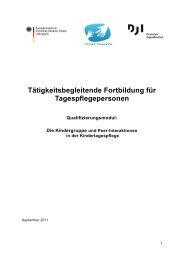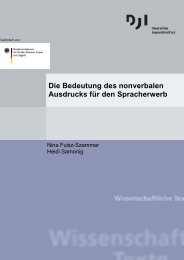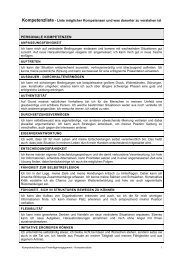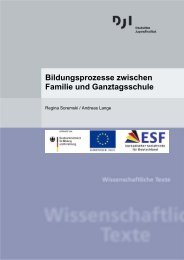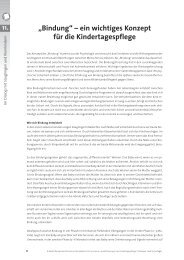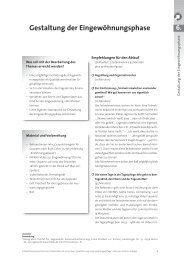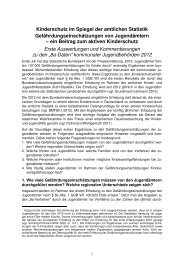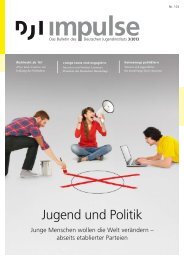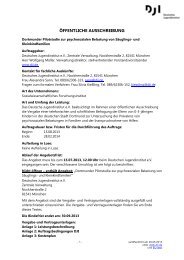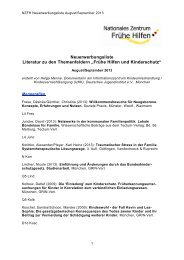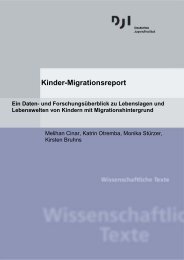download - Deutsches Jugendinstitut e.V.
download - Deutsches Jugendinstitut e.V.
download - Deutsches Jugendinstitut e.V.
Create successful ePaper yourself
Turn your PDF publications into a flip-book with our unique Google optimized e-Paper software.
Programs and Measures in vulnerable neighbourhoods, working with<br />
children and young people<br />
Choices Programme<br />
Choices Programme will be generically presented, and then a special focus will be given to<br />
one of the 120 local projects fundraised: “Cool Generation” project, from Almada in the<br />
suburbs of Lisbon.<br />
The sudden increase in the perception of juvenile criminality in August 2000, as also the<br />
massive media coverage of the events, frightened the Portuguese society in general. The<br />
existence of emerging groups of individuals with similar social backgrounds, mainly from<br />
suburban neighbourhoods, that had criminal and delinquent practices, lead to the<br />
Ministries Council Resolution n.º 108/2000, in the 19th of August, that established the<br />
basic settings for two kinds of responses: intervention – creating the necessary conditions<br />
for the implementation of the new Child Protection Law and Youth Crime Law (1999),<br />
separating victims and offenders children and youngsters; prevention – delegating on the<br />
National Commission for the protection of Children and Youngsers at Risk, the creation of<br />
a Programme that aimed crime prevention and the inegration of youngsters form the most<br />
vulnerable neighbourhoods in Lisbon, Oporto and Setúbal.<br />
Critical Urban Areas Initiative<br />
National Program led by Land Planning and Cities Secretary of State and an instrument of<br />
City Policy.<br />
Intends to intervene in neighbourhoods that present critical vulnerabilities and aims<br />
integrated socio-territorial interventions. Started with an experimental phase in three<br />
territories (Cova da Moura – Amadora; Lagarteiro – Porto and Vale da Amoreira – Moita).<br />
The Initiative involved seven ministries (presidential, environment, labour and social<br />
security, internal affairs, health, education and culture), but at present as much as 91<br />
institutions/organizations/local associations participate in it, with plans based on shared<br />
diagnosis and produced by Local Partners Groups.<br />
Both study cases share the following conditions:<br />
− Having the inclusion of children and young people in disadvantage as targets<br />
for intervention<br />
− Active partnerships involving State, local organizations and civil society<br />
− Multi-tier, co-shared, participatory, multi-territorial and multi-level governance<br />
systems with a range of national, regional and local actors.<br />
− Integrated projects with a socio-territorial base<br />
− mobilizing projects expected to have structural impacts<br />
− Innovation-driven interventions<br />
− strategic coordination and participation of local actors<br />
19



